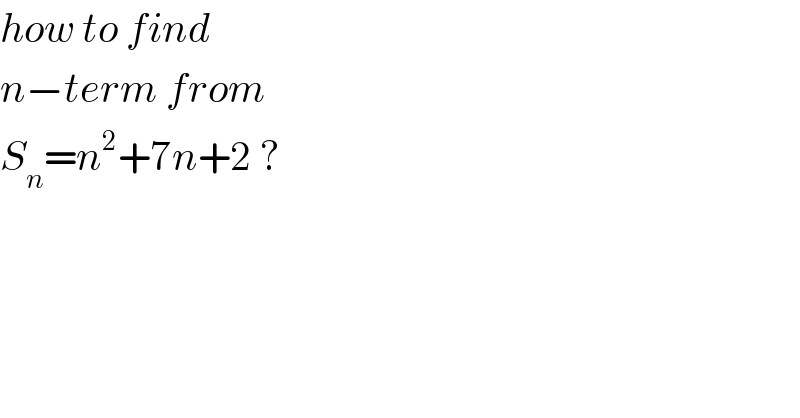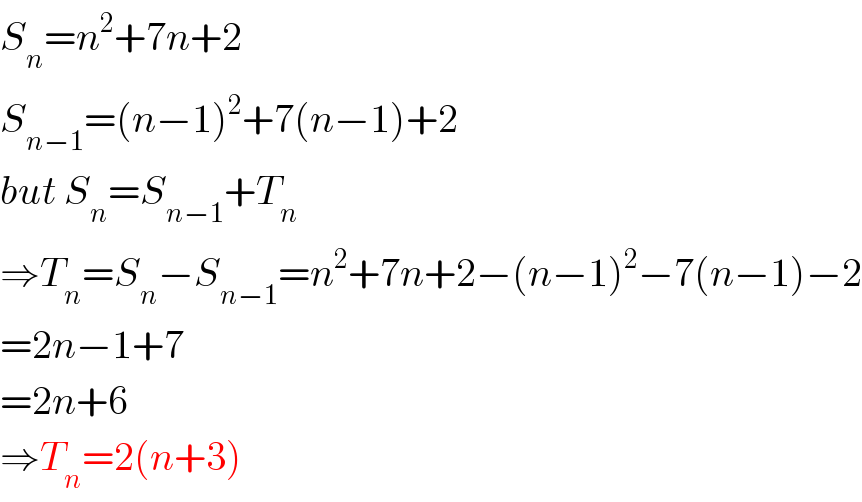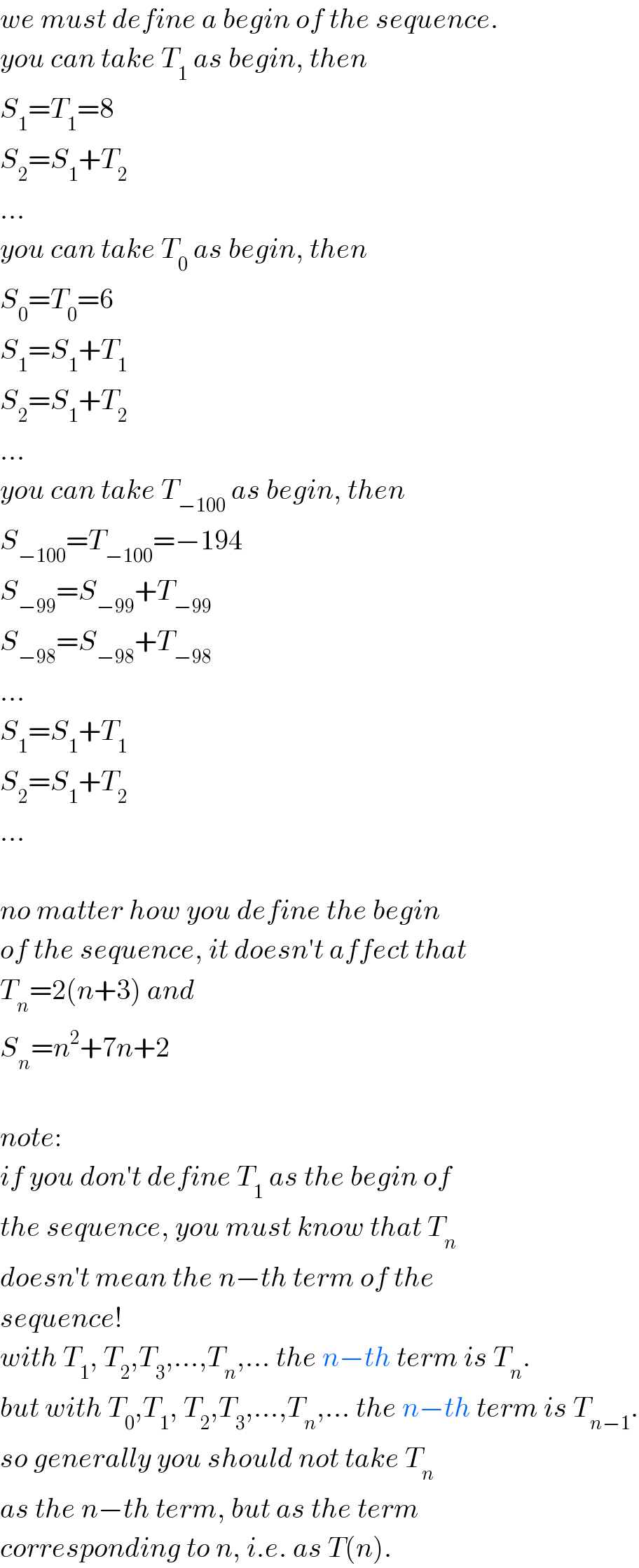
Question Number 77722 by jagoll last updated on 09/Jan/20

$${how}\:{to}\:{find}\: \\ $$$${n}−{term}\:{from} \\ $$$${S}_{{n}} ={n}^{\mathrm{2}} +\mathrm{7}{n}+\mathrm{2}\:? \\ $$
Commented by Kunal12588 last updated on 09/Jan/20

$${pls}\:{refer}\:{Qno}.\:\:\mathrm{76793} \\ $$
Commented by jagoll last updated on 09/Jan/20

$${why}\:{T}_{\mathrm{1}} \:{from}\:{T}_{{n}} =\mathrm{2}{n}+\mathrm{6}\:{not} \\ $$$${same}\:{from}\:{S}_{{n}} ?\: \\ $$$${i}\:{think}\:{T}_{{n}} =\mathrm{2}{n}+\mathrm{6}\:{not}\:{valid} \\ $$
Answered by mr W last updated on 09/Jan/20

$${S}_{{n}} ={n}^{\mathrm{2}} +\mathrm{7}{n}+\mathrm{2} \\ $$$${S}_{{n}−\mathrm{1}} =\left({n}−\mathrm{1}\right)^{\mathrm{2}} +\mathrm{7}\left({n}−\mathrm{1}\right)+\mathrm{2} \\ $$$${but}\:{S}_{{n}} ={S}_{{n}−\mathrm{1}} +{T}_{{n}} \\ $$$$\Rightarrow{T}_{{n}} ={S}_{{n}} −{S}_{{n}−\mathrm{1}} ={n}^{\mathrm{2}} +\mathrm{7}{n}+\mathrm{2}−\left({n}−\mathrm{1}\right)^{\mathrm{2}} −\mathrm{7}\left({n}−\mathrm{1}\right)−\mathrm{2} \\ $$$$=\mathrm{2}{n}−\mathrm{1}+\mathrm{7} \\ $$$$=\mathrm{2}{n}+\mathrm{6} \\ $$$$\Rightarrow{T}_{{n}} =\mathrm{2}\left({n}+\mathrm{3}\right) \\ $$
Commented by jagoll last updated on 09/Jan/20

$${it}\:{mean}\:{T}_{\mathrm{1}} =\:{S}_{\mathrm{1}} −{S}_{\mathrm{0}\:} \\ $$$${what}\:{the}\:{meaning}\:{S}_{\mathrm{0}\:} ?\:{sum}\:{of}\:{zero}\:{term}? \\ $$
Commented by mr W last updated on 09/Jan/20

$${we}\:{must}\:{define}\:{a}\:{begin}\:{of}\:{the}\:{sequence}. \\ $$$${you}\:{can}\:{take}\:{T}_{\mathrm{1}} \:{as}\:{begin},\:{then} \\ $$$${S}_{\mathrm{1}} ={T}_{\mathrm{1}} =\mathrm{8} \\ $$$${S}_{\mathrm{2}} ={S}_{\mathrm{1}} +{T}_{\mathrm{2}} \\ $$$$... \\ $$$${you}\:{can}\:{take}\:{T}_{\mathrm{0}} \:{as}\:{begin},\:{then} \\ $$$${S}_{\mathrm{0}} ={T}_{\mathrm{0}} =\mathrm{6} \\ $$$${S}_{\mathrm{1}} ={S}_{\mathrm{1}} +{T}_{\mathrm{1}} \\ $$$${S}_{\mathrm{2}} ={S}_{\mathrm{1}} +{T}_{\mathrm{2}} \\ $$$$... \\ $$$${you}\:{can}\:{take}\:{T}_{−\mathrm{100}} \:{as}\:{begin},\:{then} \\ $$$${S}_{−\mathrm{100}} ={T}_{−\mathrm{100}} =−\mathrm{194} \\ $$$${S}_{−\mathrm{99}} ={S}_{−\mathrm{99}} +{T}_{−\mathrm{99}} \\ $$$${S}_{−\mathrm{98}} ={S}_{−\mathrm{98}} +{T}_{−\mathrm{98}} \\ $$$$... \\ $$$${S}_{\mathrm{1}} ={S}_{\mathrm{1}} +{T}_{\mathrm{1}} \\ $$$${S}_{\mathrm{2}} ={S}_{\mathrm{1}} +{T}_{\mathrm{2}} \\ $$$$... \\ $$$$ \\ $$$${no}\:{matter}\:{how}\:{you}\:{define}\:{the}\:{begin} \\ $$$${of}\:{the}\:{sequence},\:{it}\:{doesn}'{t}\:{affect}\:{that} \\ $$$${T}_{{n}} =\mathrm{2}\left({n}+\mathrm{3}\right)\:{and} \\ $$$${S}_{{n}} ={n}^{\mathrm{2}} +\mathrm{7}{n}+\mathrm{2} \\ $$$$ \\ $$$${note}: \\ $$$${if}\:{you}\:{don}'{t}\:{define}\:{T}_{\mathrm{1}} \:{as}\:{the}\:{begin}\:{of} \\ $$$${the}\:{sequence},\:{you}\:{must}\:{know}\:{that}\:{T}_{{n}} \\ $$$${doesn}'{t}\:{mean}\:{the}\:{n}−{th}\:{term}\:{of}\:{the} \\ $$$${sequence}! \\ $$$${with}\:{T}_{\mathrm{1}} ,\:{T}_{\mathrm{2}} ,{T}_{\mathrm{3}} ,...,{T}_{{n}} ,...\:{the}\:{n}−{th}\:{term}\:{is}\:{T}_{{n}} . \\ $$$${but}\:{with}\:{T}_{\mathrm{0}} ,{T}_{\mathrm{1}} ,\:{T}_{\mathrm{2}} ,{T}_{\mathrm{3}} ,...,{T}_{{n}} ,...\:{the}\:{n}−{th}\:{term}\:{is}\:{T}_{{n}−\mathrm{1}} . \\ $$$${so}\:{generally}\:{you}\:{should}\:{not}\:{take}\:{T}_{{n}} \\ $$$${as}\:{the}\:{n}−{th}\:{term},\:{but}\:{as}\:{the}\:{term} \\ $$$${corresponding}\:{to}\:{n},\:{i}.{e}.\:{as}\:{T}\left({n}\right). \\ $$
